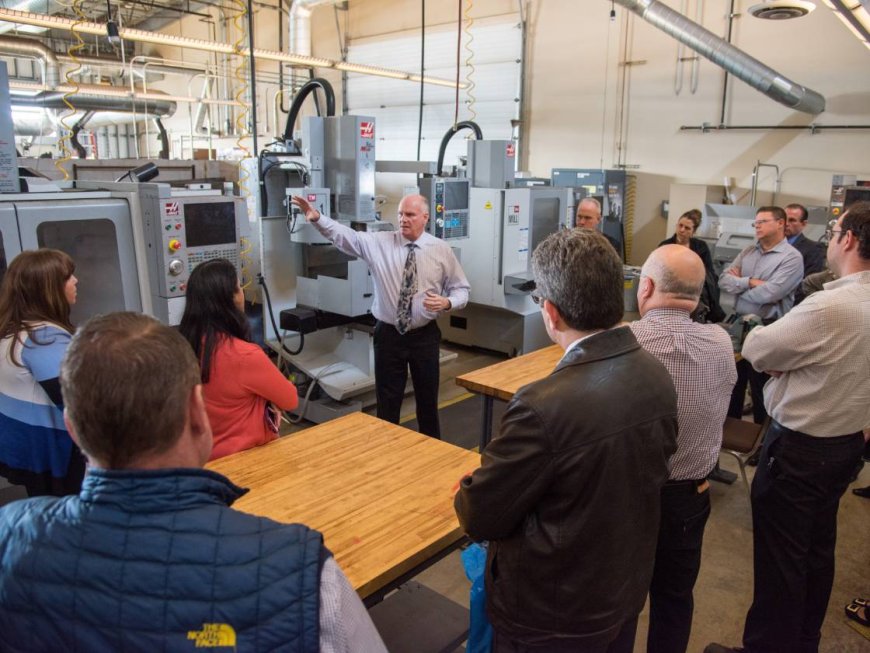Top 7 Ways Training Improves Productivity in Manufacturing
Top 7 Ways Training Improves Productivity in Manufacturing

How Can Training Improve Productivity in Manufacturing?
Productivity in the fast-paced industrial industry is essential to success. Good training programmes can greatly increase productivity by giving staff members the abilities and information they need to complete their jobs quickly and effectively. Training makes sure that employees are competent and secure in their responsibilities by emphasising topics like quality control, operating machinery, and safety procedures.
On-going education also promotes a culture of creativity and flexibility, which enables manufacturing procedures to advance and get better. This increases overall performance and product quality while reducing errors and downtime. Consequently, industrial organisations that want to maintain their competitiveness and experience steady growth should consider making strategic investments in comprehensive training programmes. Therefore, in this piece of writing, we’ll describe how training can improve productivity in manufacturing.
Top 7 Ways Training Improves Productivity in Manufacturing
Productivity is essential for preserving profitability and efficiency in the manufacturing sector. The industry is always up against obstacles like rapidly changing technologies, strict quality requirements, and the requirement for effective procedures. Well-designed training programmes are among the best strategies to deal with these issues and increase output. This blog examines the different ways that training initiatives can boost manufacturing productivity. So, dig deeper into this article to reveal the notion.
1. Up skilling Employees
The abilities needed in manufacturing are changing along with technological advancements. By giving staff members access to the newest information and methods, training programmes help close the skills gap. By assisting employees in adjusting to new equipment, software, and procedures, up skilling helps to maintain the workforce's competency.
Employees who have received training are more productive and efficient; they can complete jobs more quickly and accurately. They also minimise downtime by being aware of the nuances of their responsibilities and the tools they utilise. For this, most industries opt for Corporate Training in Dubai to upgrade the skills and expertise of their employees.
2. Reducing Errors and Waste
The goal of training programmes is to improve workers' accuracy and precision in their work. Employees are less prone to make mistakes when they are knowledgeable about their tasks. Error reduction immediately affects the bottom line by reducing waste and rework.
Maintaining good standards is easier for a workforce that has received proper training. Having training in quality control procedures guarantees that goods fulfil industry requirements or surpass them, which lowers the number of returns and defective goods.
3. Improving Safety
Safety is of utmost importance in manufacturing environments due to potential hazards. Training programmes make sure that staff members are aware of safety rules and practices and know how to handle machines properly and handle emergencies.
Businesses can drastically lower workplace accidents by placing a strong emphasis on safety throughout training. A healthier, more productive workforce, reduced medical expenses, and less downtime are all impacted by fewer accidents.
4. Fostering Innovation
Employees are encouraged to stay up to date on the newest technologies and trends in the industry through training programmes that support continuous learning. Innovation in processes and techniques that boost productivity might result from this culture of constant improvement.
Problem-solving and analytical thinking tasks are frequently incorporated into training. Productivity can be increased by staff members who are skilled at recognising issues and finding solutions. They can also create more effective processes and techniques.
5. Enhancing Employee Morale and Retention
Frequent training makes employees feel important and increases their chances of job satisfaction. A greater sense of purpose and motivation stemming from this enhanced job satisfaction ultimately increases output.
Paying for training programmes that promote staff growth can lower attrition rates. A corporation that invests in its employees' growth will see fewer expenses and disruptions from high employee turnover because their loyalty is higher.
6. Implementing Technology and Automation
Training programmes are crucial as modern technology and automation are incorporated into industry on a growing basis. To make the most of these new technologies and increase efficiency, staff members must be able to operate with them.
Employee integration and effective management of automated systems can be facilitated by training programmes. When automation is properly trained, it can increase productivity rather than decrease it, which makes operations run more smoothly and produce better outcomes.
7. Leadership and Management Development
Programmes for developing managers with strong leadership skills are essential for producing productive teams. An efficient workplace can be created by competent leaders who can uplift and motivate their groups.
Developing and executing strategies that boost productivity is made easier for executives with training in strategic planning. In manufacturing, lasting achievement is mostly dependent on efficient planning and execution. Therefore, you can establish Corporate Training in Dubai to develop the leadership skills in your employees that eventually bestow high-profile service to your customers.
Get Ready to Invest in Training Program
Companies may build a more effective and productive workforce through upskilling workers, cutting down on errors and waste, boosting safety, encouraging innovation, raising satisfaction with work, putting technology and automation into practice, developing leadership, tailoring training programmes, and utilising data and analytics. A resilient, flexible, and forward-thinking company that can prosper in a constantly shifting market is what you get when you invest in training, not simply quick profits.

 Allowhub3
Allowhub3 










